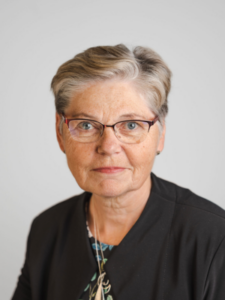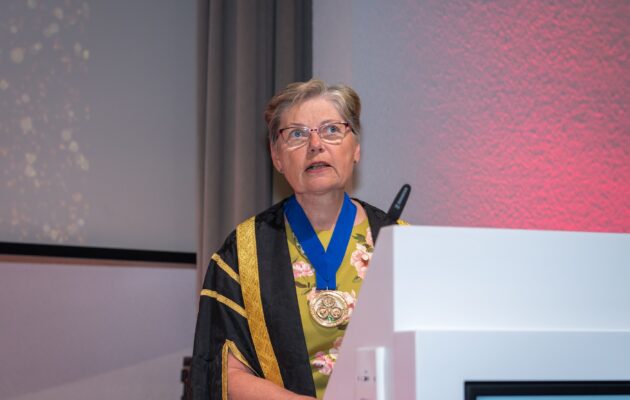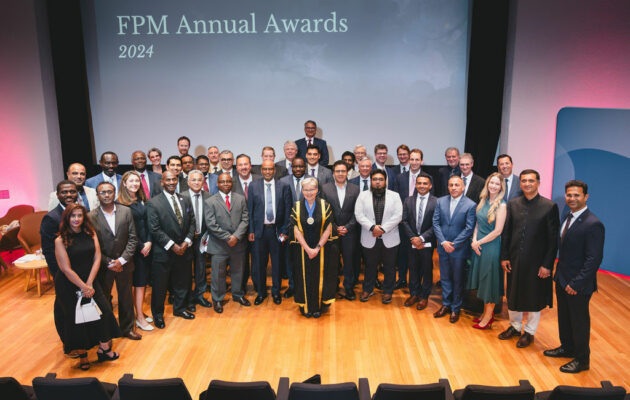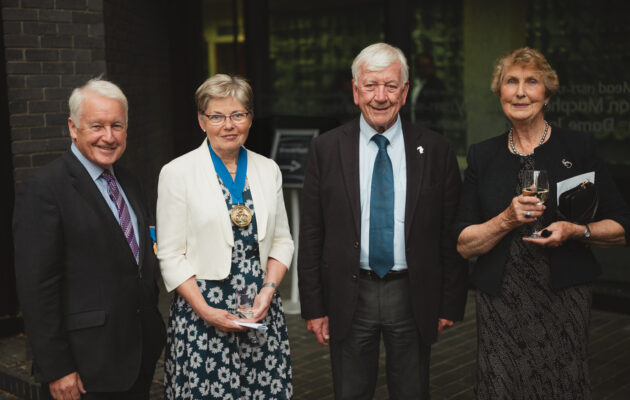Farewell to our President Dr Flic Gabbay
Posted on: Monday 11 November 2024
Author: Dr Flic Gabbay

As I demit from the FPM Presidency, I reflect on an extraordinary period of socioeconomic change that has impacted healthcare. I have been President of the Faculty of Pharmaceutical Medicine of the three Royal Colleges of Physicians of the UK during a period when we have had four UK Prime Ministers and six Secretaries of State for Health, a period of global and national financial turbulence (especially for charities) and a pandemic thrown in!
 I took up the Presidency in November 2021 at an AGM that was held virtually due to COVID. It was a time of unparalleled innovation in the UK life sciences – notably for FPM the many pharmaceutical physician colleagues leading vaccines, passive immunisation and treatment innovations at rapid speed. FPM played an important role in providing insight into research, regulatory information and appropriate medicines access for other college Presidents and government departments, as well as contributing to NICE reviews. FPM Vice-President Dr Sheuli Porkess and I worked through Christmas 2021 with the FPM Infectious Diseases expert group to prepare reports and then, later, we held cross-disciplinary meetings via a COVID Working Group to deliver recommendations. One important finding was that many doctors needed better access to current information about preventing and treating respiratory diseases, leading to the recent launch of a new e-Learning package on this topic, sponsored by Pfizer and developed by FPM staff and our expert members. As a neat bookend to my presidency, FPM’s witness statement submitted to Module 4 of the UK COVID-19 Inquiry, has been my swansong on COVID.
I took up the Presidency in November 2021 at an AGM that was held virtually due to COVID. It was a time of unparalleled innovation in the UK life sciences – notably for FPM the many pharmaceutical physician colleagues leading vaccines, passive immunisation and treatment innovations at rapid speed. FPM played an important role in providing insight into research, regulatory information and appropriate medicines access for other college Presidents and government departments, as well as contributing to NICE reviews. FPM Vice-President Dr Sheuli Porkess and I worked through Christmas 2021 with the FPM Infectious Diseases expert group to prepare reports and then, later, we held cross-disciplinary meetings via a COVID Working Group to deliver recommendations. One important finding was that many doctors needed better access to current information about preventing and treating respiratory diseases, leading to the recent launch of a new e-Learning package on this topic, sponsored by Pfizer and developed by FPM staff and our expert members. As a neat bookend to my presidency, FPM’s witness statement submitted to Module 4 of the UK COVID-19 Inquiry, has been my swansong on COVID.
Although COVID has extensively dominated of my term, FPM has achieved much else besides over the last three years. The standards and training activities have included: updating the PharmaTrain syllabus and the FPM curriculum for Pharmaceutical Medicine Specialist Training; developing the Diploma in Pharmaceutical Medicine Training Programme and examinations for online delivery, the latter additionally with remote invigilation; and we have also had our highest number of doctors connected to the GMC since the appraisal process started and are working to support our International Medical Graduates (IMGs) to have the opportunity apply to be on the GMC register, which I know was much requested.
The recognition of our importance to the life sciences ecosystem came to the fore during the pandemic and put an increased spotlight on FPM resulting in many collaborations through the Academy of Medical Royal Colleges (AoMRC) and NIHR, which have raised FPM’s profile at national level. FPM has also raised its profile in leading and being involved in consultations on many topics relating to innovation of, and access to, medicines and devices with an increasing breadth of discussions with stakeholders, including patients.
However, amongst the biggest of achievements is the comprehensive programme of updating the digital infrastructure of FPM, including a completely new CRM system for membership, event bookings, and financial management. We also introduced a new Learning Management System for training, as well as a new mentoring platform called FPM Connect.
The FPM Board has had two rounds of informal governance review of the Board and Officers’ roles in FPM and we continue to review policies to bring us in line with best practice, including safeguarding policies for FPM staff and volunteers, and a new complaints procedure.
We owe a great deal to our Chief Executive who has overseen all these activities which have involved a substantial investment of time, culture change and funding. All this was completed during a period of economic and political turmoil including a volatile stock market and resulting interest rates This was compounded by a reluctance for some companies to return to their office base after the pandemic and subsequently a loss of FPM’s tenants.
Despite all the challenges, the forecast is for FPM to be financially stable and our membership is growing. The new ‘direct’ route to Fellowship of FPM, to align with the other royal colleges, was introduced this year, and routes to Membership continue to be extended since they were introduced in 2022 to recognise examinations that are analogous to the DPM, both in the UK and overseas.
Our overseas colleagues have been involved with the launch of the Middle East Association of Pharmaceutical Medicine Professionals (MEAPP), as well as engaging with the American Academy of Physicians In Clinical Research (APCR) and, of course, the International Federation of Associations of Pharmaceutical Physicians and Pharmaceutical Medicine (IFAPP).
As I hand over the baton to Dr Sheuli Porkess at the AGM this year, I have to thank her for her support as Vice President during the last three years, especially in 2024 when I have had periods of compassionate leave of absence. I also have to thank our Chief Executive Dr Marcia Philbin and her team for all the work they have done as well to support FPM during a time when not only have we maintained and grown our profile but have built a sound infrastructure and achieved growth. Thanks must also go to the extraordinary number of pharmaceutical physicians who devote huge amounts of time to FPM, far too many to thank individually, but the Officers and Committee Chairs, committee members and the examiners give extensive amounts of unremunerated voluntary service without which FPM could not survive.




